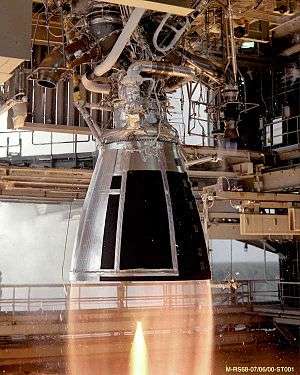RD-263
| Country of origin | USSR |
|---|---|
| Date | 1969-1975 |
| Designer | Energomash, V.Glushko |
| Manufacturer | PA Yuzhmash[1] |
| Associated L/V | R-36M and Dnepr |
| Status | Out of Production |
| Liquid-fuel engine | |
| Propellant | N2O4 / UDMH |
| Mixture ratio | 2.67 |
| Cycle | Oxidizer Rich Staged Combustion |
| Configuration | |
| Chamber | 1[2] |
| Performance | |
| Thrust (vac.) | 1,128 kilonewtons (254,000 lbf) |
| Thrust (SL) | 1,040 kilonewtons (230,000 lbf) |
| Chamber pressure | 20.6 megapascals (2,990 psi) |
| Isp (vac.) | 318 s (3.12 km/s) |
| Isp (SL) | 293 s (2.87 km/s) |
| Gimbal range | 7°[3] |
| Dimensions | |
| Length | 2,150 millimetres (85 in) |
| Diameter | 1,080 millimetres (43 in) |
| Dry weight | 870 kilograms (1,920 lb) |
| Used in | |
| R-36M and R-36MUTTKh core stage (15А14 and 15A18) | |
| References | |
| References | [2][4] |
The RD-263 (GRAU Index 15D117) is a liquid rocket engine, burning N2O4 and UDMH in the oxidizer rich staged combustion cycle.[2] Four RD-263 form a propulsion module RD-264 (GRAU Index 15D119).[5] For the R-36M KB Yuzhnoye only ordered the first stage propulsion to Energomash, instead of both stages, arguing that they were overworked with the RD-270 development. By April 1970 Yuzhnoye was getting the engine documentation. By the end of 1972 Energomash started to test fire the engines in its own test stand. And by September 1973 the engine was certified for flight.[1] While the engine is out of production, the ICBM as well as the Dnepr remain operational as of 2015.[3]
Versions
The basic engine has been used for the
- RD-263 (GRAU Index: 15D117): Initial version used on the R-36M and R-36MUTTKh first stage (15А14 and 15A18).[2][4]
- RD-268 (GRAU Index: 15D168): Variation used on the MR-UR-100 (15А15) and MR-UR-100UTTKh (15A16) first stage.[4][6][7][8]
- RD-273 (AKA RD-263F): Improved version based on the RD-263F upgrade project. Version used on the R-36M2 (15A18M) and (15A18M2) first stage.[7][9][10][11]
| Engine | RD-263 | RD-268 | RD-273 |
|---|---|---|---|
| AKA | 15D117 | 15D168 | RD-263F |
| Propulsion Module | RD-264 | N/A | RD-274 |
| Development | 1969-1975 | 1970-1976 | 1982-1988 |
| Engine Type | Liquid oxidizer rich staged combustion using N2O4/UDMH propellant with an O/F ratio of 2.67 | ||
| Combustion Chamber Pressure | 20.6 MPa (2,990 psi) | 22.6 MPa (3,280 psi) | 22.6 MPa (3,280 psi) |
| Thrust (Vacuum) | 1,130 kN (250,000 lbf) | 1,240 kN (280,000 lbf) | 1,240 kN (280,000 lbf) |
| Thrust (Sea Level) | 1,040 kN (230,000 lbf) | 1,130 kN (250,000 lbf) | 1,130 kN (250,000 lbf) |
| Isp (Vacuum) | 318s | 318.5s | 318s |
| Isp (Sea Level) | 293s | 295.6s | 296s |
| Length | 2,150 mm (85 in) | 2,150 mm (85 in) | 2,150 mm (85 in) |
| Width | 1,080 mm (43 in) | 1,083 mm (42.6 in) | 1,080 mm (43 in) |
| Dry Weight | 870 kg (1,920 lb) | 770 kg (1,700 lb) | Unknown |
| Use | R-36M (15А14) and R-36MUTTKh (15A18) core stage | MR-UR-100 (15А15) and MR-UR-100UTTKh (15A16) first stage | R-36M2 (15A18M) and (15A18M2) first stage |
| Status | Out of Production | Retired[12] | Retired[13] |
| References | [2][4][6][9][10][11] | ||
Modules
Some of these engines were bundled into modules of multiple engines. The relevant modules and auxiliary engines are:
- RD-264 (GRAU Index 15D119): A module comprising four RD-263. Propulsion module of the R-36M and R-36MUTTKh first stage (15А14 and 15A18).[4][5]
- RD-274 (GRAU Index ): A module comprising four RD-273. Propulsion module of the R-36M2 (15A18M) and (15A18M2) first stage.[7][11][14]
See also
- R-36M - ICBM for which this engine was originally developed for.
- Dnepr - launch vehicle that is a repurposed R-36MUTTKh.
- Rocket engine using liquid fuel
References
- 1 2 Zak, Anatoly. "R-36M/15A14/SS-18/Satan/RS-20". RussianSpaceWeb.com. Retrieved 2015-06-20.
- 1 2 3 4 5 "RD-263". Encyclopedia Astronautica. Retrieved 2015-06-20.
- 1 2 Zak, Anatoly. "The Dnepr launcher". RussianSpaceWeb.com. Retrieved 2015-06-20.
- 1 2 3 4 5 "NPO Energomash list of engines". NPO Energomash. Retrieved 2015-06-20.
- 1 2 "RD-264". Encyclopedia Astronautica. Retrieved 2015-06-20.
- 1 2 "RD-268". Encyclopedia Astronautica. Retrieved 2015-07-24.
- 1 2 3 McDowell, Jonathan. "Russian engines". Jonathan's Space Report. Retrieved 2015-07-24.
- ↑ "History". NPO Energomash. Retrieved 2015-07-24.
- 1 2 "RD-263F". Encyclopedia Astronautica. Retrieved 2015-07-24.
- 1 2 "RD-273". Encyclopedia Astronautica. Retrieved 2015-07-24.
- 1 2 3 Lardier, Christian. "Liquid Propellant Engines in the Soviet Union". IAA History Simposia. American Astronautical Society. 19: 39–73.
- ↑ "Ballistic Missiles". missilethreat.com. Missile Threat. Retrieved 2015-07-24.
- ↑ "Kazakhstan Missiles" (PDF). Nuclear Threat Initiative. August 2012. Retrieved 2015-07-24.
- ↑ "RD-274". Encyclopedia Astronautica. Retrieved 2015-07-24.
External links
- KbKhA official information on the engine.
- Encyclopedia Astronautica information on the propulsion module.
